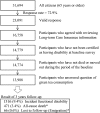Green tea consumption and the risk of incident functional disability in elderly Japanese: the Ohsaki Cohort 2006 Study
- PMID: 22277550
- PMCID: PMC3278248
- DOI: 10.3945/ajcn.111.023200
Green tea consumption and the risk of incident functional disability in elderly Japanese: the Ohsaki Cohort 2006 Study
Abstract
Background: Previous studies have reported that green tea consumption is associated with a lower risk of diseases that cause functional disability, such as stroke, cognitive impairment, and osteoporosis. Although it is expected that green tea consumption would lower the risk of incident functional disability, this has never been investigated directly.
Objective: The objective was to determine the association between green tea consumption and incident functional disability in elderly individuals.
Design: We conducted a prospective cohort study in 13,988 Japanese individuals aged ≥65 y. Information on daily green tea consumption and other lifestyle factors was collected via questionnaire in 2006. Data on functional disability were retrieved from the public Long-term Care Insurance database, in which subjects were followed up for 3 y. We used Cox proportional hazards regression analysis to investigate the association between green tea consumption and functional disability.
Results: The 3-y incidence of functional disability was 9.4% (1316 cases). The multiple-adjusted HR (95% CI) of incident functional disability was 0.90 (0.77, 1.06) among respondents who consumed 1-2 cups green tea/d, 0.75 (0.64, 0.88) for those who consumed 3-4 cups/d, and 0.67 (0.57, 0.79) for those who consumed ≥5 cups/d in comparison with those who consumed <1 cup/d (P-trend < 0.001).
Conclusion: Green tea consumption is significantly associated with a lower risk of incident functional disability, even after adjustment for possible confounding factors.
Figures
References
-
- Kuriyama S, Shimazu T, Ohmori K, Kikuchi N, Nakaya N, Nishino Y, Tsubono Y, Tsuji I. Green tea consumption and mortality due to cardiovascular disease, cancer, and all causes in Japan: the Ohsaki study. JAMA 2006;296:1255–65 - PubMed
-
- Watanabe I, Kuriyama S, Kakizaki M, Sone T, Ohmori-Matsuda K, Nakaya N, Hozawa A, Tsuji I. Green tea and death from pneumonia in Japan: the Ohsaki cohort study. Am J Clin Nutr 2009;90:672–9 - PubMed
-
- Kuriyama S, Hozawa A, Ohmori K, Shimazu T, Matsui T, Ebihara S, Awata S, Nagatomi R, Arai H, Tsuji I. Green tea consumption and cognitive function: a cross-sectional study from the Tsurugaya Project 1. Am J Clin Nutr 2006;83:355–61 - PubMed
-
- Niu K, Hozawa A, Kuriyama S, Ebihara S, Guo H, Nakaya N, Ohmori-Matsuda K, Takahashi H, Masamune Y, Asada M, et al. Green tea consumption is associated with depressive symptoms in the elderly. Am J Clin Nutr 2009;90:1615–22 - PubMed
-
- Hozawa A, Kuriyama S, Nakaya N, Ohmori-Matsuda K, Kakizaki M, Sone T, Nagai M, Sugawara Y, Nitta A, Tomata Y, et al. Green tea consumption is associated with lower psychological distress in a general population: the Ohsaki Cohort 2006 Study. Am J Clin Nutr 2009;90:1390–6 - PubMed
Publication types
MeSH terms
Substances
LinkOut - more resources
Full Text Sources
Medical


